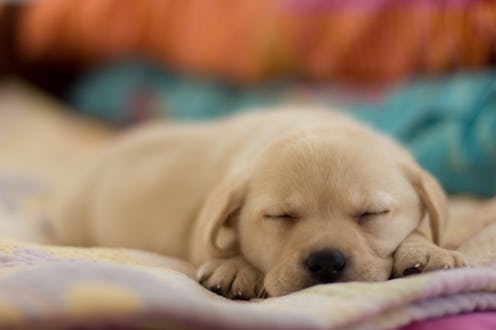Life
Here's A Reason To Get More Sleep Tonight

College students may be notorious for pulling all-nighters, but they're far from the only people to regularly run on four hours of sleep, a Red Bull, and the hope that nothing too mentally taxing is asked of them that day. Chances are, more than a third of you reading this are running on less than seven hours of sleep (including me, but we all know how journalists are addicted to coffee), and according to a recent study, it might be ruining more than just your complexion. According to a recent study, sleep loss impedes decision-making in high stakes situations. If that doesn't make you suddenly paranoid about your last trip to the emergency room, you're a much more trusting person than the rest of us. Since the Centers for Disease Control declared sleep deprivation a public epidemic, many studies have looked at the effects of sleep loss. It's been linked to everything from false memories to skin aging, and there's even evidence that it increases junk food consumption. According to researchers at Washington University, we can now add impaired decision-making to the list. Half of the 26 participants were allowed to sleep normally, but the other half were required to stay up for 62 hours straight, Science Daily reports.
While living in a sleep laboratory for six days, participants were asked to complete a task in which they had to decide whether certain predetermined numbers were "no" or "go." As time went by, participants in both groups got better at categorizing numbers, but in order to simulate real-world decision making, researchers switched the categories without telling them. Here's where sleep deprivation started to have an effect: volunteers who were able to sleep caught on quickly, but those who were sleep deprived had almost a zero percent success rate.
According to the researchers, this explains many stories we see in the news; as Science Daily points out, disasters like Chernobyl and the Challenger explosion could be traced back to sleep-deprived operators. “People in high-stakes environments are held accountable for their actions when they are fatigued just like everyone else," researcher Hans Van Dongen said. "However... when someone is sleep-deprived their brain simply can't process feedback from their actions and changing circumstances."
When you consider that the list of the top 10 most sleep-deprived jobs in the U.S. includes physicians, paramedics, police officers, and plant officers, it's a little disconcerting. Although the study has relatively few participants and has yet to be replicated, it's clear that chronic sleep loss isn't something to mess around with. So next time you're torn between finishing your impromptu marathon of The Office on Netflix and getting a nigh-unheard of seven hours of sleep, you might want to consider choosing sleep this time. I'm sure Jim Halpert would understand.
Images: George Chelebiev/Flickr; Giphy (2)